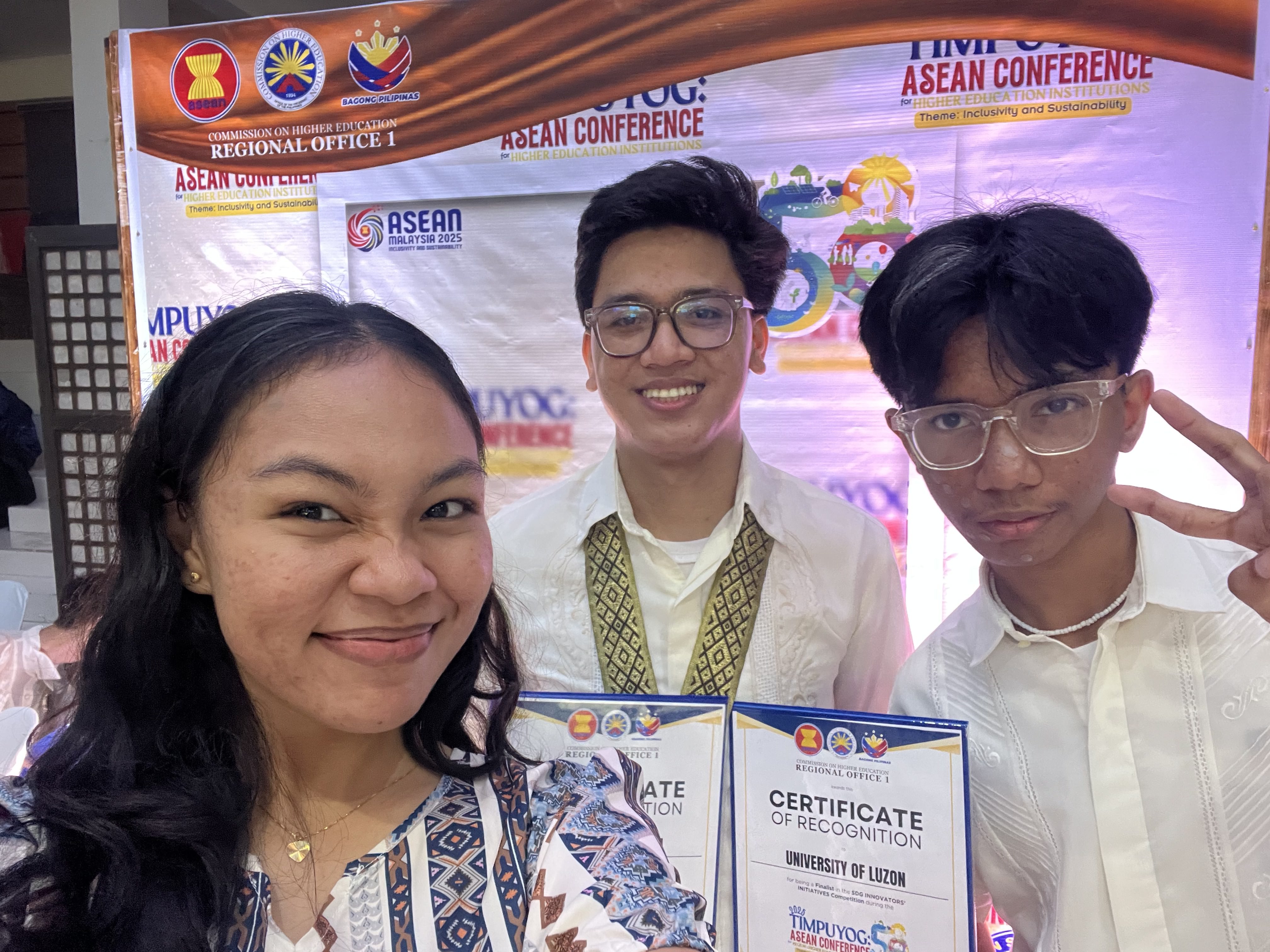University of Luzon Students Achieve Top Honors in Regional Sustainable Development Goal Competitions
Posted on 30th of Sep 2025 by UL AdministratorThe University of Luzon is proud to celebrate the outstanding performance of its students in two major regional innovation challenges focused on the United Nations Sustainable Development Goals (SDGs). These accomplishments underscore the university’s dedication to fostering practical, sustainability-focused research and development among its student body. The success of these bright Luzonians on a competitive platform is a testament to the rigorous academic environment and the culture of impactful innovation championed by the institution.
The university’s achievements were formally recognized during the Timpuyog: ASEAN Conference, held on September 29, 2025. The conference celebrated the culmination of the ASEAN SDG Living Labs Challenge and the SDG Innovators’ Initiative, which brought together top student proposals from across the region. In a remarkable display of ingenuity, a team from the University of Luzon’s College of Engineering and Architecture (CEA-AIT) National Service Training Program (NSTP) was crowned Champion of the highly contested ASEAN SDG LIVING LAB CHALLENGE. The winning project, titled SOL-AERO: Solar Powered Aeroponics, proposes a revolutionary approach to resource-efficient farming. By integrating aeroponics—a soil-less method of growing plants by suspending roots in the air and misting them with nutrient-rich water—with clean, renewable solar energy, the project offers a blueprint for sustainable, high-yield agriculture, particularly in energy-scarce or space-limited environments.
The SOL-AERO project, which has been under implementation since April 2022, was a collaboration led by students under the supervision of Professor Dante P. Narciso. The implementation partner for this initiative is Malued Elementary School in Barangay Malued, Dagupan City, Pangasinan, transforming the school grounds into a “living laboratory.” The success of this groundbreaking effort is credited to team members Joseph B. Macadenden Jr. and Raine Gianah Valdez, the Presenters and Proponents, alongside fellow member Piolo P. Saclayan. Justin Lawrence Arias stood as proxy for Saclayan during the awarding ceremonies.
Further solidifying the university’s position as a hub for environmental solutions, another innovative project secured a spot in the Top 5 of the concurrent SDG INNOVATORS’ INITIATIVE. This project, Project Pandaragupan: Transforming the Old Dagupan Dumpsite into a Solid Waste Management (SWM) Facility and Eco Park, tackles a critical urban issue by proposing a comprehensive plan for environmental remediation and sustainable land use. Set for implementation in January 2026, this visionary initiative was authored and presented by Joseph B. Macadenden Jr., who serves as the Creative Director of the United Architects of the Philippines Student Auxiliary- University of Luzon (UAPSAUL). Developed in partnership with the Local Government Unit of Dagupan City, Pangasinan, the project outlines a detailed strategy to convert the former dumpsite—once a major source of toxic emissions like methane—into a functional and educational Eco Park and a modern, responsible solid waste management facility. The dual focus not only cleans up legacy pollution and significantly improves air quality for nearby communities, but also establishes a model for circular economy by creating livelihood opportunities through recycling enterprises and compost sales.
These dual recognitions highlight the depth and breadth of the solutions being conceptualized and developed by Luzonians. Their commitment to applying academic knowledge to real-world challenges, from food security to urban environmental quality, sets a powerful example for their peers and elevates the University of Luzon’s profile as a leader in regionally relevant, globally conscious research. The university community extends its heartfelt congratulations to all the students involved for their dedication, hard work, and visionary thinking.
These exemplary student-led activities directly address several core Sustainable Development Goals. The development of SOL-AERO strongly aligns with SDG 2 (Zero Hunger) by promoting innovative, resilient, and sustainable food production systems, and SDG 7 (Affordable and Clean Energy) through its utilization of solar power. Furthermore, the project directly supports SDG 3 (Good Health and Well-being) by improving access to fresh produce for the school’s feeding program, and SDG 4 (Quality Education) by using the system as a hands-on learning tool for science and sustainability. Concurrently, the ambitious Project Pandaragupan is a clear driver for achieving SDG 3 (Good Health and Well-being) by drastically reducing illnesses from hazardous pollution at the former dumpsite; SDG 8 (Decent Work and Economic Growth) by creating livelihood opportunities through recycling enterprises; SDG 11 (Sustainable Cities and Communities) by transforming a contaminated area into a green public space; and SDG 12 (Responsible Consumption and Production) by improving municipal waste management and promoting a circular economy. Together, both projects also support the broader goals of SDG 9 (Industry, Innovation, and Infrastructure) and SDG 13 (Climate Action) by proposing tangible, scalable solutions for a more sustainable and equitable future.






